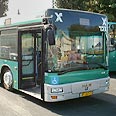
MKs asked to 'stop apartheid on kosher bus lines'
Chairwoman of religious women's forum sends letter to Knesset members, calling on them to act against segregated buses: 'This is a radical action of discrimination, oppression and humiliation'
Not giving up: A month and a half after the High Court of Justice spoke out against "kosher" bus lines serving the ultra-Orthodox community, Knesset members were also called to act against the phenomenon.
In a letter sent to MKs on Sunday, Rachel Keren, chairwoman of the religious women's forum Kolech, called the phenomenon "an apartheid" and argued that it was "an extreme act of discrimination, oppression and humiliation, claiming to be glatt kosher."
In her letter, Keren described the forcible segregation between men and women, which sometimes leads to violence. She demanded that the politicians use "all the means at your disposal to stop the process when it is still in its beginning."
The Kolech chairwoman began the letter with the halachic background which she believes proves that the segregation "marketed as an addition of holiness" has no basis in Jewish religious laws.
On the other hand, she claimed, Jewish law worries about the "dignity of people," including the dignity of women. She noted that Israel's sages had compared between humiliation and bloodshed and ruled that "a man must not put his friend to shame."
Keren went on to say that "when women object to the segregation arrangement, they receive a shower of curses and humiliations, and the incidents sometimes develop into a physical attack… The Egged bus drivers never intervene, even in radical cases."
The writer is convinced that the situation makes it difficult for women to get on the buses with children and shopping bags, including haredi women "who are used to surrender to social pressures of this kind."
'Illegal arrangement'
And as for the legal aspect, "There is no legal arrangement and there are no Transportation Ministry regulations which enable the Egged company to define certain interurban buses as lines which segregate between men and women," she claimed.
"It is safe to assume that such an arrangement would be considered illegal. The buses in question don’t even bear signs defining them as buses where gender segregation is implemented."
According to Keren, there is an "acquiescence" between Egged and the haredi passengers over the possibility to demand that women sit in the back and instruct them to do so as if this was an official procedure.
"Aggressive local organizations are created where the men create a sort of local status-quo regarding the bus, while the haredi community's representatives threaten the Egged company that if it fails to offer the segregation option, they would prefer to use private transportation companies."
The Israel Religious Action Center, which petitioned the High Court over this issue, demanded that a special committee be appointed to discuss the arrangements regarding the "kosher lines." Keren clarifies that Kolech's stance is different and that she strongly opposes such an arrangement.
"A public company like Egged is forbidden, in principle, to lend its hand to this discrimination, which constitutes a kind of 'apartheid' behavior within the State of Israel. Every person is entitled to use the public transportation freely as he or she sees fit," she said.
According to Keren, this phenomenon could lead to incidents in which non-Jews would be forced to sit in segregated seats, and would even be banned from traveling on the buses altogether.
"Those historic affairs have yet to be forgotten. Israel must not serve as a platform for similar discrimination, this time on a gender basis," she concluded.










